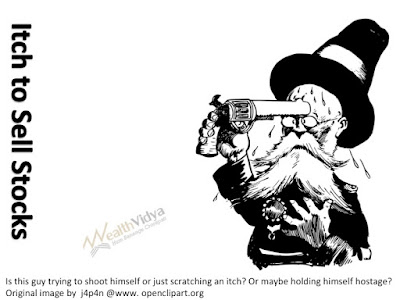Buying shares is easy – decision to sell is the most difficult.
Questions, “when to sell a stock?” and “how to sell shares?” plague even
seasoned value investors. Day traders, involved in online stock trading and
quite often short selling stocks are of course not perturbed about selling –
they buy and sell stocks and shares hundreds of times a day. So let us examine why is a decision to sell so difficult? What are the
issues involved? For who is selling difficult? In detail.
Buying shares is easy – decision to sell is the most difficult. Questions, “when to sell a stock?” and “how to sell shares?” plague even seasoned value investors. Day traders, involved in online stock trading and quite often short selling stocks are of course not perturbed about selling – they buy and sell stocks and shares hundreds of times a day. So let us examine why is a decision to sell so difficult? What are the issues involved? For who is selling difficult? In detail.
For who is it difficult to sell?
Let us address the “for
who” aspect first. For the millions of day traders all over the world, there
cannot be a more mundane or stupid question than this. They buy and
sell shares hundreds of times a day and millions of times in their
lifetimes. They are a trigger-happy lot with license to sell.
Some sell what they do not even own, which is called short selling. Please
don’t think that I am preaching from a high moral ground. I had been
a part of the tribe of day traders myself, until one day I severely burnt
my fingers, and until I chanced upon the book “The Intelligent Investor”,
a classic work of Benjamin Graham, and gradually got converted in to a value
investor. So when I speak I am speaking out of my personal
experience, from both the worlds.
People sell stocks for many
reasons, including a few bizarre ones. A Hollywood actress appears
to have sited a reason that she simply hates to see red, and the
moment she spots a red coloured blip on the computer screen of the online stock
trading platform, on any of the stocks listed in her portfolio, she immediately
sells!
On the
other hand, for a value investor, the decision to sell is the most
difficult.
Why?
Lets
examine next.
What triggers the itch to sell?
There are two types of
situations - one frivolous, and the second a serious one, backed by logic.
Let us get done with the
frivolous one first.
Silly Reason
I have mentioned many times
in various posts that the real enemy of an investor lies within and not
without. The monkey natured mind simply cannot keep quiet. Once
an investment in shares is made (after thorough research), the investor is
expected to simply forget the investment. Instead one actually
monitors it every day. Stock markets being highly dynamic in nature,
the market value of the investments constantly changes. If it goes
down, a red blip appears on the screen, and immediately it triggers fear in the
mind, on the other hand if the investment value goes up, immediately the itch to
sell and book the profit begins.
The uninterrupted chatter
produced by financial news channels further compounds the dilemma of the
investor.
The answer to this frivolous itch
to sell is a simple NO!
Serious Dilemma
The real and serious dilemma,
whether to sell or not sell arises when the market is at the peak and the share
purchased by the investor has actually steeply appreciated - say two to three
times - and the investor is tormented by the fear that if one does not sell,
there is a real danger of missing the opportunity to book profit and invest the
handsome harvest in a safe, fixed income yielding instrument like a fixed
deposit with a bank or a bond.
This line of thinking is further
strengthened by the reasoning that the same share can again be bought by the
same investor in future at a lower price when the market falls to an unreasonably
pessimistic level. Indeed, this is a perfect and sound logic!
Let us now examine the real
issues involved in the serous dilemma.
The
argument in favor of selling:
Why
is it such a difficult decision to sell?
Philosophical perspective:
For a value investor holding
a share in a company is ownership of the company itself, however small the
stake may be. For her it is like she is one of the partners of
the company. It is her business. It is her baby. It is
like her home, meant to live for a lifetime – not
for trading! This is not just an emotional attachment, but
based on sound logic and age-old wisdom too.
Thorough
prior research:
A value investor would
already have conducted a prolonged and thorough research of the company before
making the investment. Having already passed the stringent scrutiny there
should be little hesitation to hold the shares for long time, maybe even forver, unless some fundamental change has happened either within the company
like ownership or management change or outside, in the business environment;
Excellent
management:
Usually the promoter
directors of great companies also act truly in a fiduciary capacity – that is
in the interest of minority shareholders rather than in their
self-interest. In certain exceptional cases the management simply
excels in growing shareholder wealth. A rare but perfect example is
Berkshire Hathaway Inc., under my guru, Warren Buffett. In such a
situation shareholders don’t sell their shares as they see no reason to do so –
their wealth automatically grows – they simply have to hold on to their shares!
Shares
generate lifetime cash flows:
Shares in the portfolio of a
value investor generate healthy dividends year after year. The
quantum of dividend and dividend yield to the investor keeps on increasing on
the back of growth in business issue of bonus shares. These
dividends earn back the capital invested in a few years and still continue to
generate dividend cash flows for the investor for perpetuity.
EPS
growth based price appreciation:
The
price of scrip fluctuates for two reasons – short-term speculative activity and
long-term growth or decline based on the earnings per share (EPS).
When the market is unusually
bullish the share price may go up disproportionate to its EPS. That
is instead of trading at a normal price to earnings (PE) multiple of say 10 -15
it may be trading at say 30 or 40. In such a situation the price
might have appreciated two or three times the cost of purchase of an investor,
triggering the itch to sell and make profit.
On the contrary the price of
a share may go up, not because of speculative reason but on account of EPS
growth, which in turn has grown on the back increase in sales and profits of
the company.
If an investor sells merely
to book profit because the price has appreciated, he will miss out on the
natural and real increase in price on account of growth in EPS in the long
term.
The
argument in favor of selling:
Since markets see steep ups
and downs, investor can sell when the price has appreciated steeply and the
same share can be purchased again in future, when the market falls to pessimistic
levels.
But as I have experienced it
myself, once we liquidate our holdings phenomenal changes in the long-term prospects
of the company or to the country’ economy or the market behaviour could take
place, making the share expensive and shut us out of investing in the same company
for years, effectively depriving us off of growth in dividends and bonus shares
forever. Therefore Warren Buffett says that dancing in and out of investments
may not be a good idea.
My Experience in Liquidating Entire Holding
As far as my actual personal experience goes, I had completely sold off my investment only once, that is,
after my conversion to value investing. This was in the years
2009-10. After the market meltdown following the Lehman Brothers
incident, the BSE Sensex lost 57% value from its high of 20325 in January 2008
to 8762 in March 2009. Financial markets were agog with doomsday
predictions. Comparisons were made to the Great Depression
of 1930s.
G20 countries and leaders,
including India, took concerted actions to stimulate the global economy.
All this certainly unnerved
me.
Of course I did not panic and
sell at the bottom. I held on to my portfolio.
However, when the market
again rebounded steeply to about 15600 by August 2009 (a 78% recovery in just five
months), I had sold my entire portfolio. The market advanced rapidly for
sometime and steadily over many years. I could not invest in the
share market for many years because the prices had become unrealistic and I
was simply shut out of the market.
I could reenter the market only
when BSE Sensex was at 20599.
Have I not missed the growth
in the Sensex of about 10000 points by my sell action?
Suggested Further Reading
- How Frequent Changes to Mutual Fund Portfolio Affect Investor Interest?
- Margin Trading Definition
- What is Short-Covering?
Conclusion
We have seen that buying shares is quite easy – decision to sell is the most difficult to make. However even though questions like, “when to sell a stock?” and “how to sell shares?” plague even seasoned value investors and day traders, involved in online stock trading and quite often short selling stocks are selling away to glory, the debate proves that stocks of excellent companies should be held forever and shall not be sold.







